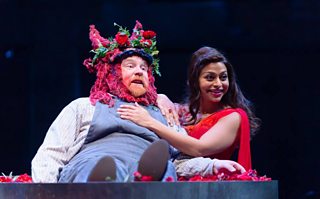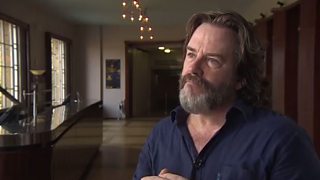Biggest Bottoms: who's made an ass of themselves?
“I have had a dream - past the wit of man to say what dream it was. Man is but an ass if he go about to expound this dream..."
Weaver, overconfident amateur actor and unexpected object of Titania's affections: Nick Bottom is the comic heart of A Midsummer Night's Dream, one of Shakespeare's best loved and most often adapted comedies.
The Royal Shakespeare Company is currently touring its latest production of Dream across the UK, with a twist: it intertwines a cast of professional actors with regional amateur theatre companies who have stepped up to play the Rude Mechanicals, including 14 of Britain's best Bottoms. The Βι¶ΉΤΌΕΔ has been capturing the magic all over the country, following amateur companies from the moment they're selected by the RSC up to their opening night performance, in programmes to be shown in each region on Friday 20th May.
Meanwhile, we've had a delve back through past productions of Dream both on stage and screen to highlight the amazing catalogue of actors and comedians who have donned a donkey's head - or at the least, donkey's ears - in the name of one crazy midsummer's night. Bottoms up!
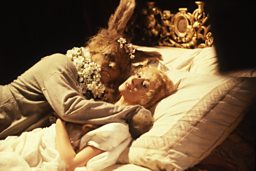
Matt Lucas: 2016

Certainly not the first comedian to show his Bottom, the erstwhile Little Britain writer and performer Matt Lucas will be part of an all-star cast in Russell T. Davies' upcoming Βι¶ΉΤΌΕΔ One adaptation of Dream. Lucas will be following in his writing partner David Walliams' Bottom-shaped footsteps and playing opposite Maxine Peake as Titania, and alongside John Hannah, Elaine Paige and Bernard Cribbins, as part of the Βι¶ΉΤΌΕΔ's 2016 Shakespeare celebrations.
Benny Hill: 1964
Screened on Midsummer's Day, 1964, this ITV adaptation pulled in 3.8 million viewers - the Bard's greatest television audience to that date. Transmitted to honour 400 years since Shakespeare's birth and directed by Joan Kemp-Welch, the production deliberately sought to appeal to a wide audience, casting comics and musical theatre actors alongside more traditional thespians like Patrick Allen and Peter Wyngarde.
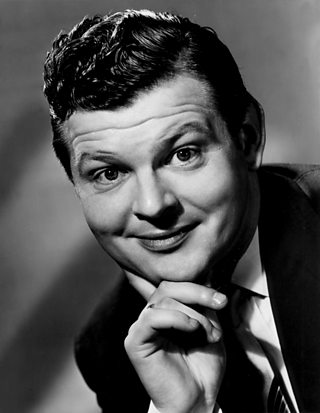
Philip Purser, The Sunday Telegraph's television critic from 1961-87, recounts a wonderful anecdote concerning Benny Hill's performance as Bottom.
"I found Joan Kemp-Welch’s production good, with its cobwebby forest setting, Mendelssohn’s music and a superb, Lucifer-like Oberon from Peter Wyngarde. And, yes, Benny Hill did make the most of his part. But to give him sole billing above the title while ignoring the gods and lordly mortals of the cast was surely putting the cart before the horse? As I typed this I suddenly spotted, and substituted, an alternative version – it would be putting the arse before the court. They liked it in Arts and Features, but had to clear such a rude word with the paper’s founding editor, the donnish ex-schoolmaster Donald McLachlan. He pronounced it acceptable as a play on words. A letter from Michael Flanders, who with Donald Swann formed a celebrated comedy act, was printed the next week. Did my jest, he wondered, reflect my sincere opinion – or was I guilty of putting the coarse before the art?"
David Walliams: 2013
David Walliams beat his Little Britain co-star in the race to Bottom by three years, starring in a psychedelic, 60s-soaked production at London's Noel Coward theatre. Playing opposite Sheridan Smith as Titania, Walliams proved popular with both critics and the public, winning a WhatsOnStage award for Best Supporting Actor.
...I found it impossible to take my eyes off him, even if tears of laughter occasionally obscured the view
Writing in The Guardian, Michael Billington was impressed with Walliams' performance: “Above all, Walliams has the knack of instinctively connecting with an audience, whether it be in his awed recollection of his donkey's tackle or in his funny play-within-the-play Pyramus who takes the stage with enamelled self-assurance and who is hilariously reluctant to depart.” Tim Walker, writing in the Telegraph, went one step further, praising both lead performances but ultimately concluding, "I felt, however, for Miss Smith in her scenes with Walliams, as I found it impossible to take my eyes off him, even if tears of laughter occasionally obscured the view."
Al Murray: 2016
While he performed in just the one scene as part of the Βι¶ΉΤΌΕΔ's Shakespeare Live, Al Murray impressed with his Bottom, enthralling Judi Dench's Titania with his braying song in the short time available to him.
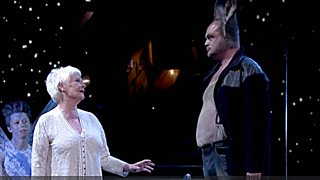
Speaking to Good Morning Britain, Murray said "my Mum will be proud to see my Bottom".
James Cagney: 1935
The only Academy Award winner on this list (though not for his Bottom), Cagney was praised for his performance in this early film version of Dream, despite it being his first - and only - Shakespearean role. In contrast to his usual Hollywood blockbusters, this film was a commercial flop, though received an Oscar nomination for Best Picture and has been well reviewed in hindsight, with Emanuel Levy writing that: "'A Midsummer Night’s Dream' remains a bold Shakespearean film...Relying on a large ensemble of gifted actors, it was an impressive film to have come out of the studio machine...James Cagney, then known for his crime-gangster films, is brilliant as vainglorious amateur Bottom".
Johnny Vegas: 2005
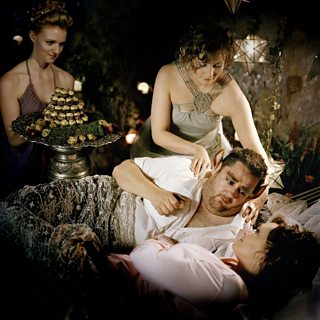
In 2005 the Βι¶ΉΤΌΕΔ produced a series of four Shakespeare interpretations, and in 'ShakespeaRe-told', Macbeth became James McAvoy's chef Joe Macbeth, Beatrice and Benedick were transported to a news studio as warring anchors, the Taming of the Shrew featured a politician with a PR problem and A Midsummer Night's Dream took place in a modern-day holiday camp - Dream Park. Doing away with the original dialogue and so taking the story only, this adaptation saw Johnny Vegas as Bottom, here a Dream Park security guard with ambitions of making it on to the entertainment staff.
Kevin Kline: 1999
Michael Hoffman directed this Hollywood version of Dream, setting the action in 1890s Tuscany. The cast is jam-packed with A-list stars, including Stanley Tucci as Puck, Christian Bale in a pre-Batman incarnation as Demetrius, and Rupert Everett and Michelle Pfeiffer as quarrelling fairies Oberon and Titania.
As might be expected, Kevin Kline steals the show with his hearty gifts for comedy
Much of the praise for the film revolved around Kline's Bottom. In the San Francisco Chronicle, Peter Stack wrote:
"Purists will quibble, but William Shakespeare's A Midsummer Night's Dream is a playful, sexy piece of work - just what the Bard might have conjured up for a movie adaptation of his beloved spring-fever comedy. The film is over the top - and willfully so ... As might be expected, Kevin Kline steals the show with his hearty gifts for comedy ... Kline, a Shakespearean veteran, has that flourish, that golden touch. In his glorious way of overdoing it - turning the very notion of acting into farce - he embodies a supreme comic madness that is audacious yet embracing ..."
However, Janet Maslin in the New York Times was more acid-tongued: “Not even Michelle Pfeiffer's commanding loveliness as the fairy queen Titania, and her ability to speak of such things as 'my bower' with perfect ease, can offset the decision to have the actors grapple awkwardly with bicycles.”
Brian Glover: 1981
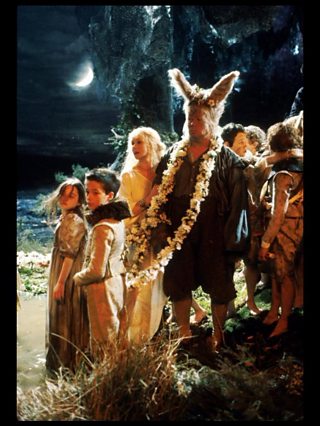
In this 1981 Βι¶ΉΤΌΕΔ Television Shakespeare adaptation, described as "a dark-hued, somewhat claustrophobic and vaguely menacing production", Brian Glover got his Bottom out with Helen Mirren as the besotted Titania. Notable for being the only former wrestler on this list, Glover sported a luxurious mane of donkey hair, a change both from his usual bald pate and his string of roles playing tough guys and criminals.
Dawn French: 2001
The only lady Bottom to make it on to this list, Dawn French was generally well-received by critics for her Shakespearean debut. The stage production was set in a 1940s English manor house, with Benedict Nightingale writing in The Times that French's performance was: "funnier and jollier than many of the male actors I've seen in the role."
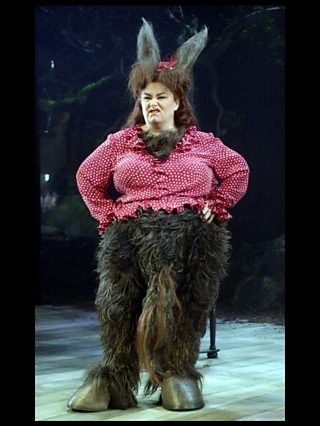
French's comedy partner Jennifer Saunders was particularly effusive in her praise, saying that the show was "fabulous....I'm very proud of Dawn's Bottom. I always have been."
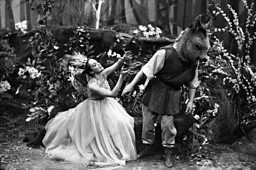
Paul Rogers: 1958 and 1968
Rogers played Bottom no less than three times: in a 1958 Βι¶ΉΤΌΕΔ Sunday night theatre adaptation (also featuring Peter Sallis as Snug), at the Royal Shakespeare Company under the direction of Peter Hall, and in the subsequent big screen adaptation in 1968 - the first live-action, colour version of the play committed to celluloid. Another all-star lineup surrounded Rogers, including Judi Dench as Titania (scandalously scantily clad and covered in green body paint), Diana Rigg as Helena, Helen Mirren as Hermia and Ian Holm as Puck.
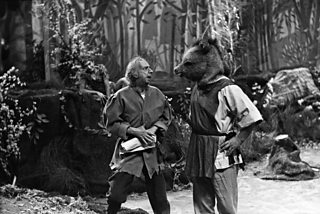
Rogers' Bottom came in for particular praise for his decision to play the part completely straight, in contrast to the usual 'gurning buffoon', though the film as a whole was not so well-received; writing in The Spectator in 1969, Penelope Houston noted that "...Mr Hall's halfway house between screen and stage looks almost as uncomfortable a perch as the curious grave-like earthwork in which Judi Dench's Titania has her sleeping-quarters."
Richard Griffiths: 1977
You felt that he was playing just to you rather than a vast auditorium
In one of his first big breaks at the Royal Shakespeare Company, Griffiths was cast as Bottom - an early showcase of his comic abilities. A member of the audience recalled: “Griffiths eschewed the traditional histrionics of Bottom's enthusiasm and underplayed if anything. His voice was perfectly modulated, rarely rising above the conversational, and his gestures were neat, precise and measured. The humour was of the driest variety, not the usual knockabout, and left an indelible impression. The audience was hooked, intrigued by what he would do next and whether he could sustain this cool style for the entire performance. He could and did. You felt that he was playing just to you rather than a vast auditorium.”
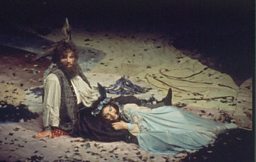
Frankie Howerd: 1957
Howerd was part of an Old Vic production of Dream, though Βι¶ΉΤΌΕΔ viewers were also offered a glimpse of his Bottom (ooh) when an extract from the production was broadcast. While known for his comedy, Howerd had originally wanted to be an actor but failed his audition at RADA. As reported in the Daily Mail, even when he landed his Shakespearean role in Dream, "with typical coarseness, he always called it the Tit and Bum Show, because the leading characters were Titania and Bottom."
Ronnie Barker: 1971
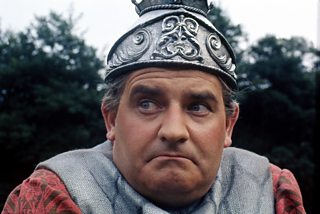
Another Bottom best known as a comedian, Ronnie Barker was described as 'perfectly cast' in this traditional adaptation of A Midsummer Night's Dream for the Βι¶ΉΤΌΕΔ's Play of the Month slot. Directed by James Cellan Jones, set in 1865 and filmed on location at Scotney Castle in Kent, the production also featured Lynn Redgrave as Helena and Michael Gambon as Theseus. The Rude Mechanicals featured two well-known sitcom actors, as Barker was backed up by John Laurie - of Dad's Army fame - as Peter Quince.
Robert Atkins: 1950
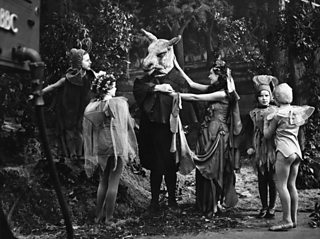
This live studio production on the Βι¶ΉΤΌΕΔ was designed for children and featured Robert Atkins, a notable theatre actor, as Bottom. Atkins was also a co-founder of Regent's Park Open Air Theatre, where he played Bottom much earlier on in his career, in a 1935 production accompanied by Mendelssohn's Incidental Music - written specifically by Mendelssohn for A Midsummer Night's Dream and used in many traditional interpretations of the play. There's not a lot of information out there about the 1950 adaptation, so perhaps its most notable feature is this really quite creepy picture of Atkins in costume...
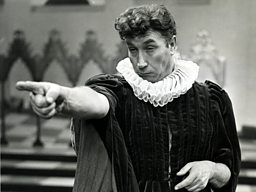

Dream 2016
The Royal Shakespeare Company is currently touring its latest production of A Midsummer Night's Dream with a cast of 18 professional actors - who will be joined by 14 different bands of amateur Rude Mechanicals at different locations around the UK. The 84 amateur performers playing the Mechanicals have been put through their paces, taking part in workshops and tasks set by the RSC team in preparation for stepping out on stage, and include part-time actors as diverse as a funeral director from Kidderminster, a pub landlord from County Durham, and a driver from London.
Of course, these productions wouldn't be complete without a star turn from 14 of Britain's Best Bottoms...
-
![]()
From Cornwall to County Durham, from the first auditions to the moment the amateurs step out on stage with the professionals: the Βι¶ΉΤΌΕΔ has been following the progress of the 'Dream 2016' to bring a behind-the-scenes look at the RSC's ambitious project.
